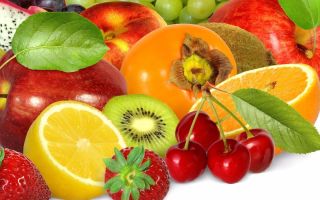Content
Collagen is a building block essential for the body. With a lack of protein, premature age-related changes appear due to failures in the work of internal organs. Collagen is found in food. It is responsible for the elasticity, firmness and strength of connective tissue: skin, ligaments, muscles, tendons, bones.
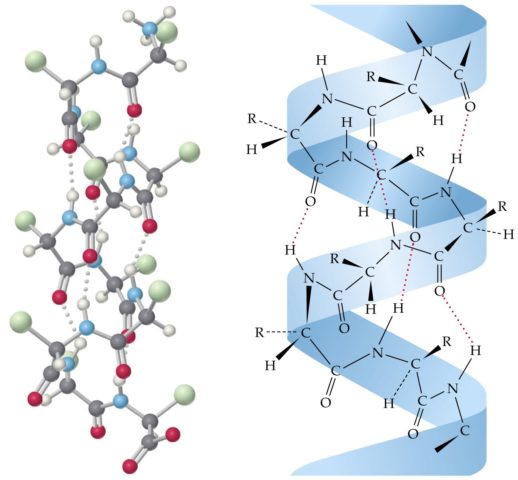
What is collagen for?
Natural collagen is found in many foods. A special protein is synthesized by the cells of the dermis. It is noteworthy that the substance is a building material and a kind of glue that helps to form and connect body cells. It is the protein compound that gives the tissues strength.
The substance is involved in the metabolism of muscle and connective tissue. Protein helps:
- strengthen cartilage, bones and joints;
- improve muscle blood flow, skin properties;
- normalize the functioning of cells.
There are 28 types of substances that are responsible for the following functions:
- protective;
- support;
- restorative.
At a young age, the elasticity of the skin is achieved by replacing old collagen fibers with new ones. Aging of the body is accompanied by the destruction of fibers. Laxity of the skin and the appearance of wrinkles are caused by a decrease in the production of a protein compound, which is caused by the following factors:
- hormonal imbalance;
- unbalanced diet;
- alcohol abuse and smoking;
- natural age-related changes;
- violation in metabolic processes;
- diseases of the digestive system and connective tissue;
- exposure to ultraviolet rays;
- prolonged stress.
Collagen fibers are produced by sex hormones:
- estrogen (in women);
- testosterone (in men).
It is known that testosterone production in men is slower than estrogen. This explains why the signs of aging appear earlier in women.
Collagen daily rate
The daily allowance depends on the level of activity. For example, experts usually recommend 7 g of protein daily. An active lifestyle requires an increase in the amount of incoming protein up to 10 g.
Collagen is found in food, which allows you to eliminate the deficiency of the substance. Their use contributes to the replenishment of protein in the body. This is why it is important to know which foods are high in collagen.
Collagen-rich foods (table)
The list of collagen products is quite extensive. Protein is found in various components of the diet. The collagen content in food is presented in the table:
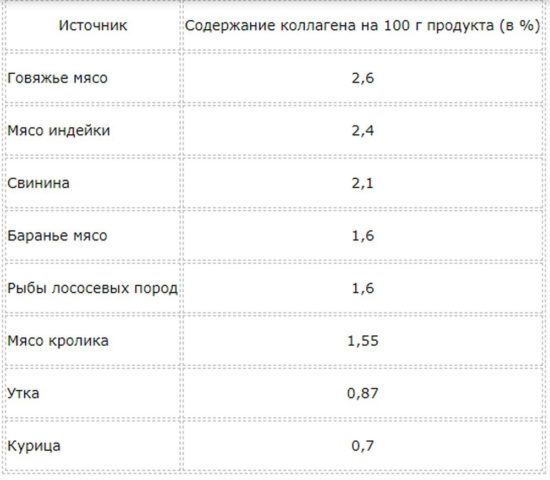
In order to replenish the required substance, you need to pay attention to the diet.Collagen products are of animal origin. Thus, the diet should contain adequate amounts of meat. Herbal products are also used for the production of collagen in the skin, in particular its fibers. This is due to the fact that they contain proteins that resemble a compound.
Meat
Foods high in collagen include meat. In particular, bone broth contains protein in a bioactive form. Beef broth is an optimal source of type 1 collagen found in food. This component has a positive effect on the appearance and condition of the skin.
Chicken and turkey broth contains type 2 protein. He is responsible for maintaining the function of the musculoskeletal system.
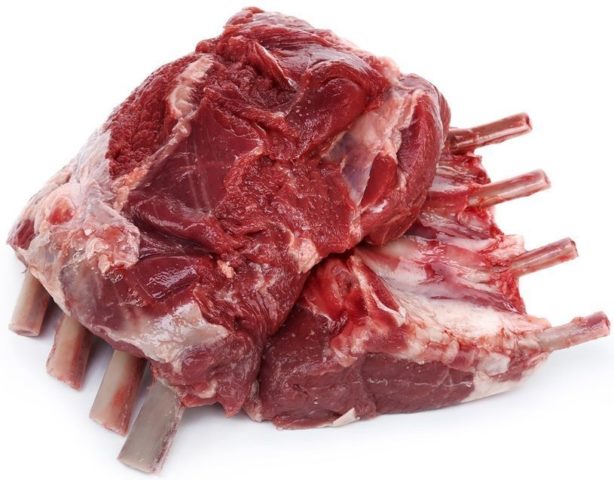
Fish and seafood
Seafood and fish are high in collagen. For example, salmon contains zinc, which aids in protein synthesis. Seafood also includes omega-3 PUFAs to keep skin hydrated and youthful.

Gelatin
Gelatin is not just a collagen synthesis product, it is the optimal way to consume essential amino acids. The product is also called collagen hydrolyzate, which is intensively processed to separate proteins.
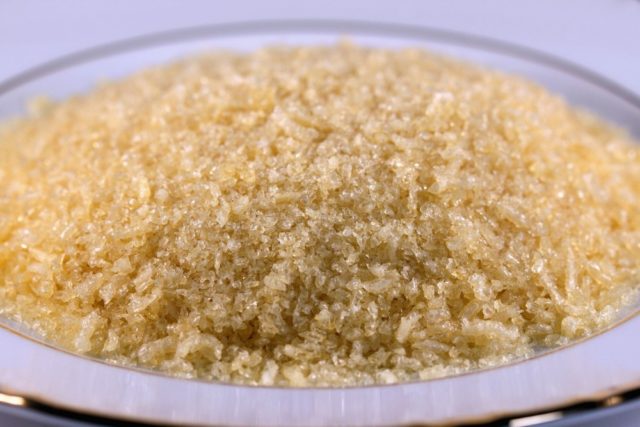
Eggs
Collagen found in food is good for the face and joints. The body gets protein from the yolk. Eggs also contain sulfur, which is essential for collagen synthesis. The component leads to liver detoxification, which is accompanied by the elimination of toxins that destroy the substance.
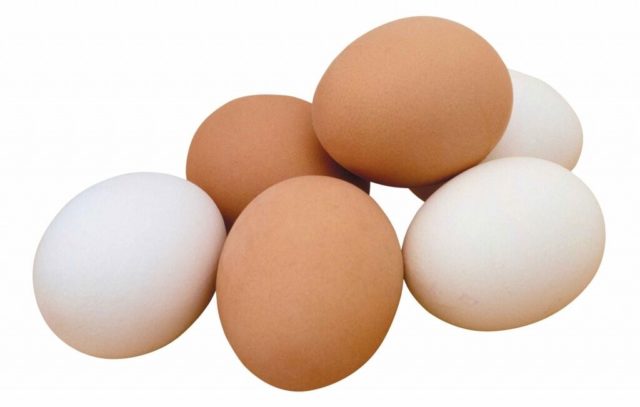
Is collagen contained in plant foods?
Products that restore skin collagen are of animal origin. However, for the assimilation of protein, vitamins and amino acids are needed, which are found in plant foods.
For the synthesis of the polypeptide, ascorbic acid (vitamin C) is needed, which is contained in strawberries, black currants, fruits and berries. Protein regeneration is enhanced by yellow and red vegetables, fruits, which include retinol (vitamin A).
Foods that promote collagen production in the body
Foods that directly affect protein production are essential. These include vegetables, fruits, seeds, dairy products.
Vegetables, fruits and berries
It is known that the consumption of green leafy vegetables is considered to be the prevention of diseases. Their beneficial property also lies in the prevention of premature collagen breakdown. Green vegetables contain chlorophyll, which increases the amount of prolagen in the skin.
Tomatoes contain lycopene, which protects the skin from exposure to ultraviolet rays. The substance activates the production of a protein compound. To obtain a significant amount of lycopene, tomatoes must be cooked.
Avocado contains tocopherol, which prevents collagen breakdown. Avocado oil also includes retinol, which promotes the production of a protein compound. Berries (strawberries, blackberries, raspberries and cranberries) are among the sources of ellaganic acid.They prevent protein breakdown when exposed to ultraviolet rays.
Citrus fruits contain ascorbic acid. Vitamin C is a binder for proline-forming amino acids. This component precedes collagen formation. The positive effects of ascorbic acid also include protection from harmful toxins.
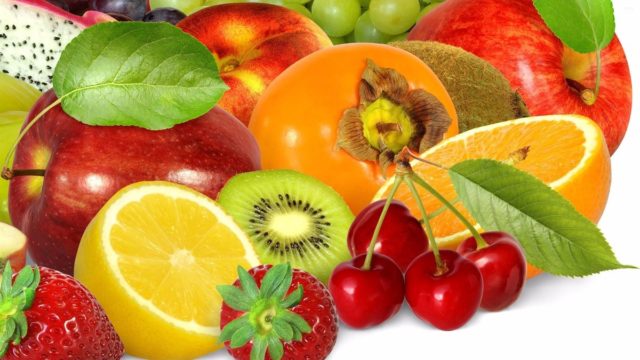
Nuts and seeds
Pumpkin seeds contain zinc, which stimulates collagen production and slows down collagen breakdown. Zinc accelerates the processes of cellular regeneration, which is reflected in the speed of wound healing.
Chia seeds, which contain omega-3 (vegetable origin), have a beneficial effect on the body. PUFAs provide smoothness and elasticity of the skin. The seeds are added to baked goods and cereals.
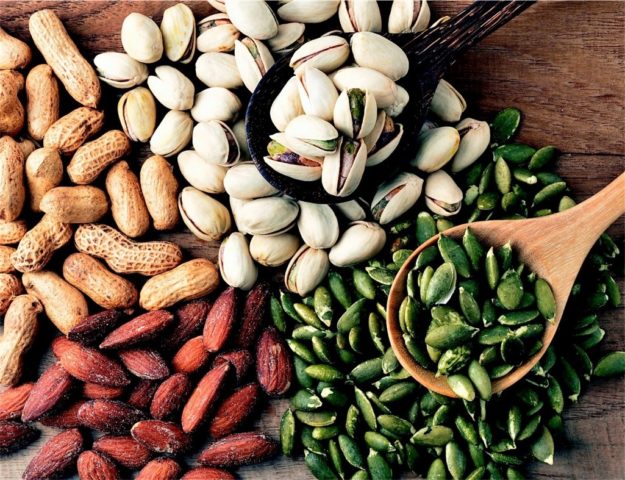
Milk and dairy products
Dairy products contain vitamin D and calcium, which stimulate collagen production.
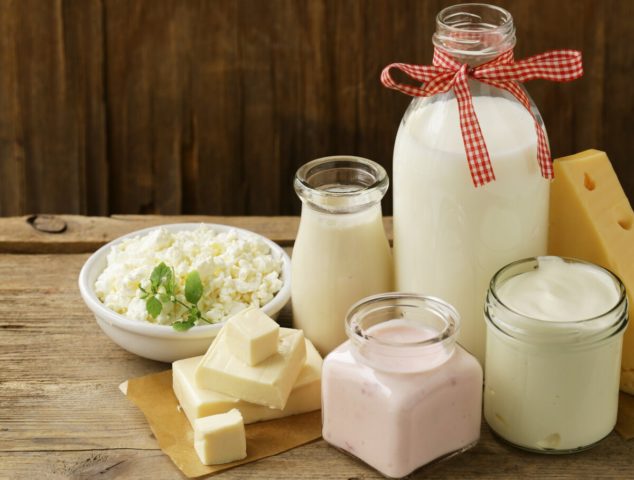
Vegetable and animal oils
Vegetable oils contain significant amounts of vitamins E and A. These compounds activate protein production in tissues. Since animal products are a source of collagen, oils can make up for the lack of a component in the body.
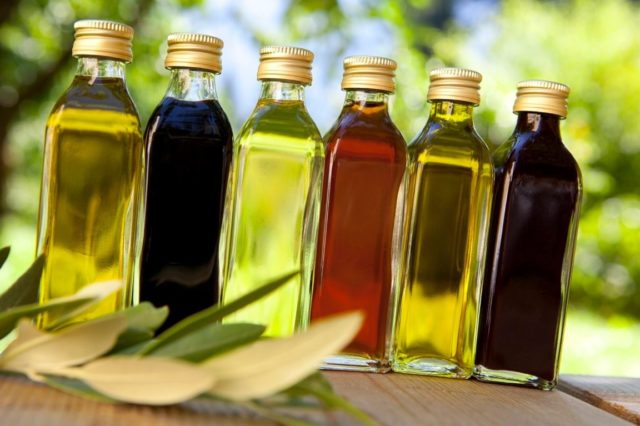
Porridge and cereals
Many people wonder if cereals contain collagen. Cereals promote protein production through their constituent vitamins and minerals. Especially valuable are:
- barley;
- oatmeal;
- rice (brown);
- corn;
- buckwheat;
- millet;
- sprouted wheat germ.
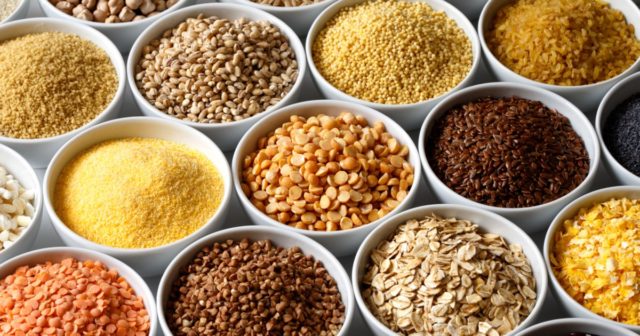
Other foods that stimulate collagen production
Promote protein synthesis:
- soy products due to the presence of genistein;
- beans due to the content of hyaluronic acid;
- food components containing vitamin A, manganese, copper, selenium;
- chocolate;
- garlic;
- dried fruits.
Collagen Destructive Products
It is important to avoid eating foods that can destroy the nutrient. These include:
- Sugar... It leads to adhesion or glycation, which causes the loss, destruction of collagen fibers. It is known that the process of glucose neutralization requires a significant amount of fluid, which reduces the elasticity of the skin. Sugar contributes to the appearance of inflammatory processes due to the oxidation of the body.
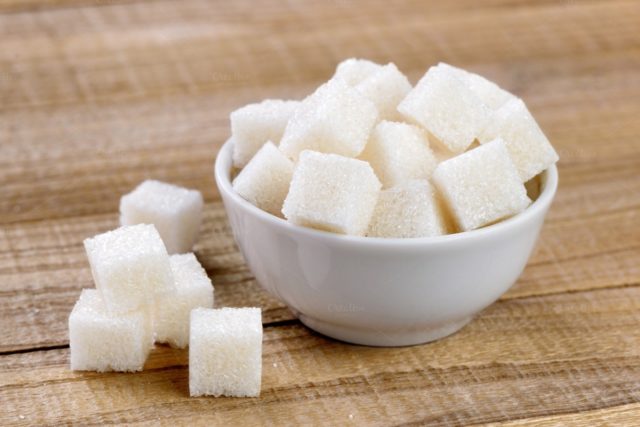 Sugar breaks down protein
Sugar breaks down protein - Alcoholic drinks... Alcohol is poison. Its toxicity is visually noticeable after significant alcohol abuse. Drinks cause the development of inflammatory processes, dehydration. To eliminate the consequences, a significant part of the necessary minerals and vitamins is spent. Thus, the skin is not getting enough essential nutrients.
 Alcoholic drinks poison the body when abused
Alcoholic drinks poison the body when abused - Tobacco... Nicotine contained in cigarettes destroys collagen fibers, reduces the production of estrogen. These hormones are responsible for the elasticity and youthfulness of the skin.
 Tobacco smoking adversely affects the condition of the skin
Tobacco smoking adversely affects the condition of the skin - Margarine... The food component contains trans fats that have a detrimental effect on the body. Cholesterol leads to loss of elasticity of the skin due to exposure to toxins and the destruction of beneficial nutrients.
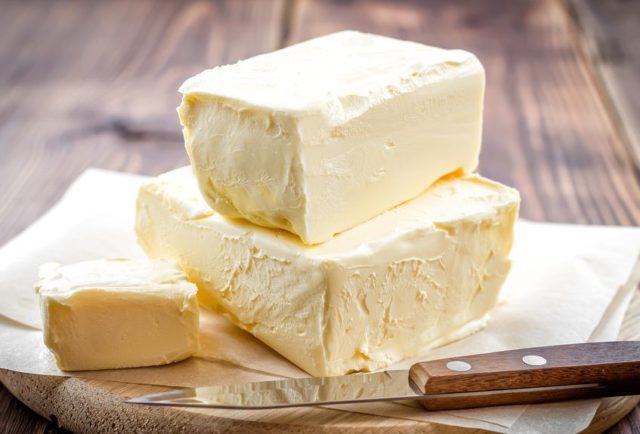 Margarine contains trans fats that are harmful to the body
Margarine contains trans fats that are harmful to the body
Conclusion
Collagen is found in animal foods.However, plant foods also contribute to the production of the substance and its absorption. This indicates the importance of a balanced diet that should include various ingredients.

